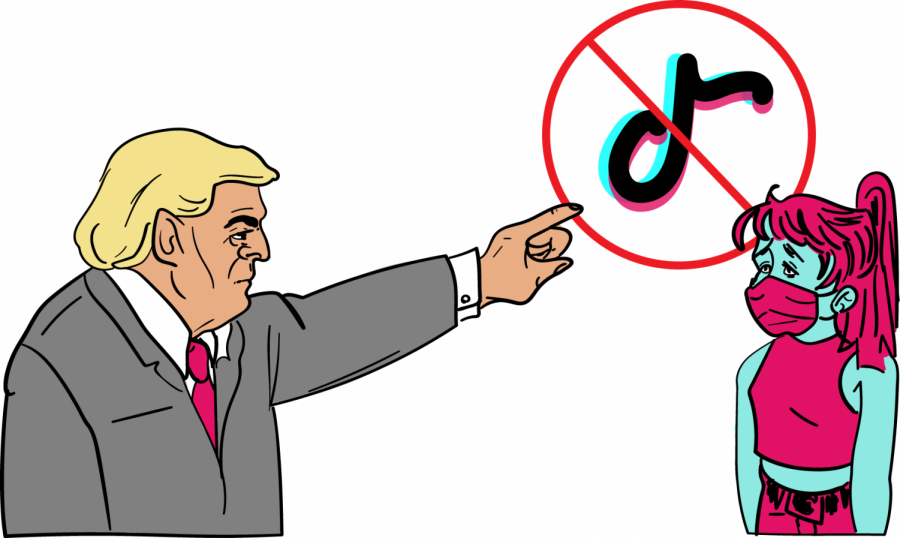TikTok vs. Trump: LASA Students Weigh in on Concerns of Hit App
October 7, 2020
TikTok, a social media app owned by Chinese tech giant ByteDance, has amassed over 500 million users worldwide. On July 7, 2020, President Donald Trump stated that his administration was considering banning TikTok, which has about 100 million American users. On Aug. 6, President Trump signed a ban of the app which would block Americans from downloading the app and prevent U.S. companies from making transactions with the app due to alleged security threat worries.
However, a day before the ban would have taken place, D.C. District Judge Carl Nichols blocked the attempted ban allowing TikTok to continue operating in the U.S. Sophomore Franklin Vinnerlid said he did not think the ban would become a reality due to President Trump’s lack of follow-through in past situations.
“I wasn’t aware if it was actually going to happen,” Vinnerlid said. “Our president has said a lot of things, but he doesn’t do them. So I assumed he was doing it to get a jab at China.”
Freshman Sophia Costell said that private data is already commonly leaked outside of TikTok. Instead, she is concerned about undue censorship.
“A lot of people don’t realize, but they already are [giving information],” Costell said. “The government already can access anything online. I just don’t want them blocking people they don’t agree with. All information should be available unless it actually harms someone.”
In June, many teens on TikTok pulled a prank on the president by ordering tickets to his rally in Tulsa. Expecting about 1 million people at the rally, Trump bragged about it on Twitter only to find out about 6,000 people actually showed up to the rally.
Sophomore Paw Eh said Trump is overly concerned over small matters such as rally attendance numbers. According to Eh, TikTok teens were able to exploit his pride and make him angry.
“He’s petty,” Eh said. “Gen Z has gotten a ride of his little ego, and now he’s mad.”
To Junior Ita Hernandez-Hernandez, Trump’s ban of TikTok makes sense. She said that though she wishes the ban wouldn’t happen, the president is attempting to enact it because users have been able to use the platform to negatively impact him.
“For people who say it’s unreasonable, Trump is banning the app because it’s being used against him,” Hernandez-Hernandez said. “It’s reasonable for him to ban the app, but I don’t like the idea.”
Some students like Junior Xander Sanders believe that what Trump is doing to the app is hypocritical. There are already many other apps which use information to find your preferences and TikTok is nothing special, according to Sanders.
“Other social media apps steal your information; that’s how algorithms work,” Sanders said. ”It’s not just TikTok. Just because other apps are U.S. companies doesn’t mean they are safe.”
While Sanders asserted that banning an app just because it’s from another country seemed unreasonable, Vinnerlid thought the ban was worrying for a different reason. He said it could worsen America’s relationship with China which has the potential to be costly.
“I don’t think it’s good to completely ban it because it hurts U.S. foreign relationships,” Vinnerlid said. ”It’s kind of like adding more flame to the fire. The government should listen to the people. Plus, it’s not a good idea to get on China’s bad side since they have a better military than ours.”
Besides the concern for foreign relations and lack of concern for TikTok’s threat to private data, Sanders stated that the government should not interfere with social media platforms anyway.
“The government should not restrict free speech unless it’s hate speech,” Sanders said, “but the apps already handle and monitor that.”
Senior Olivia Gonzalez said that even if TikTok poses a threat to user security, it should not be banned. Users should consider this risk before using the app according to Gonzalez.
“I think, if it’s a security concern…I feel it should just be a ‘use at your own risk’ type of thing,” Gonzalez said.
While Sanders argued that the government should not regulate social media at all, Vinnerlid thought some oversight should still occur. However, he said that it is important that the government doesn’t excessively regulate.
“There should be regulations which should be monitored, but the government should not fully control it,” Vinnerlid said. “We don’t want to be in a situation similar to China’s where the government controls everything.”


